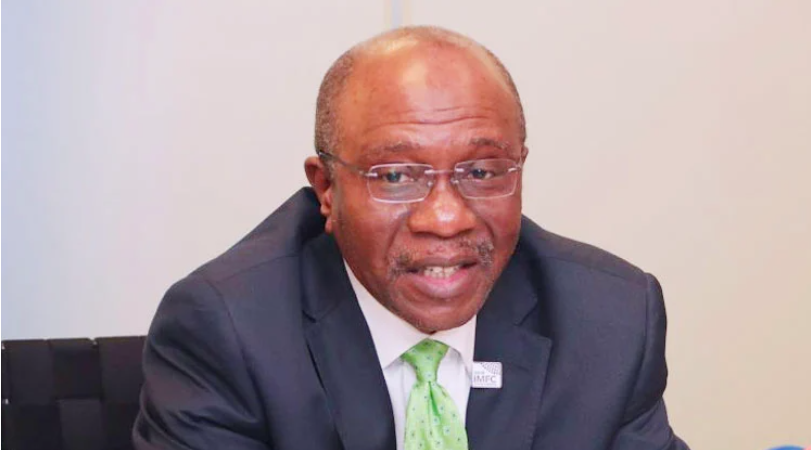Naira has lost 70% of its value since Godwin Emefiele became CBN Governor.
Newsonline reports that since the Governor of the central bank, Godwin Emefiele took office in March 2014 to date, the Naira official rate compared to the US Dollar has depreciated from N164 to N419 (or 61% weaker)
In the parallel market, the situation is even worse, whereby the Naira has weakened from $1/N180 to $1/605. This is a 70.5% depreciation of the Naira in 8 years.
Fighting a challenging battle
This rapid depreciation over a span of 8 years has occurred despite numerous forex policies by the CBN, albeit policies have been skewed towards capital controls and demand-side management.
- The fall in oil price which began in late 2014 triggered the first set of devaluation of the naira falling from N165/$1 to about N187/$1.
- By 2016, the exchange rate experienced large volatility specifically falling to about N350/$1 and then N510/$1 before the apex bank introduced the Investor & Exporter window (IEFX), which helps stabilize the rate for the next two years. Specifically, between 2017 and 2021, the official rate oscillated around the N360/$1 range.
- Note that in addition to the IEFX window, the apex bank also offered high-interest rates to foreign portfolio investment (FPI) aimed to attract associated USD$ inflows. Trillions of naira was spent by the CBN to pay interest on controversial OMO bills that attracted up to $13.4 billion in FPI in 2019.
- However, since the Covid lockdowns in 2020, the Naira exchange rate has continually depreciated on a monthly basis at the parallel market. Whilst the official rate at the IEFX also reflects exchange rate declines albeit at a slower pace.
CBN governor’s recent attempt to boost dollar inflows and save the Naira
In recent times, the CBN seems more focused on boosting organic dollar inflows.
- Specifically, in March 2021, CBN introduced the “Naira 4 Dollar Scheme”, intended to boost the inflow of diaspora remittances into the country. This program works by paying diaspora remittance recipients an incentive of N5 for every USD$1, received through licensed International Money Transfer Operator (IMTO)
- In May 2021, CBN adopted the NAFEX rate as the benchmark rate. This initiative simply meant that rather than having multiple official rates (e.g. CBN rate at N379/$ vs. IEFX rate of N410/$ at the time), the CBN simply decided to reduce the number of official rates. Arguably one benefit of this action was that it reduced the FX subsidy by at least 7.5% (N410/$ vs. $379/$)
- In July 2021, the CBN announced the discontinuation of foreign exchange (forex) sales to Bureaux De Change (BDC) operators. The governor of the CBN, Godwin Emefiele alleged that some BDC’s actions contravened the agreement with the apex bank, by seeking to maximize profits which he deemed excessive.
- In October 2021, the CBN launched the eNaira, the continent’s first digital currency. eNaira acts as both a means of exchange and a store of value, offering improved payment prospects in retail transactions when compared to cash payments.
- In February 2022, the CBN extended the Naira for Dollar scheme from the IMTOs to the IEFX window. Specifically, the CBN released instructions that outline that it will facilitate payment of N65 for every US dollar repatriated and sold at the Investors and Exporters Window.
Strategic long-term solutions
In terms of long-term potential solutions, the CBN is championing the pan-African payments system (PAPSS) whereby countries in Africa no longer need USD$ to settle intra-African trade. Such that a Nigerian trader and a South-African retailer can seamlessly settle transactions without ever needing to convert into dollars. Thus, further reducing the pressure on the Naira
Structural Headwinds
It is worth noting that despite all the efforts of the CBN, there are key macroeconomic realities which monetary policies alone are a blunt tool to impact.
Specifically, inflation and economic growth. In countries with high inflation, there is usually huge outflows of capital as folks are reluctant to save in that currency given that inflation will erode the value of your savings. When high inflation is compounded by low growth, this simply accelerates the capital flight.
Consequently, despite the flurry of new policies designed to organically attract dollar inflows, the twin challenges of high inflation and low growth remain a stumbling block to increased dollar inflows.
The CBN has the option to increase interest rates to attract more investors but thus far, the apex bank appears to be unwilling to pull that lever, attributing its stance to a need to pursue development finance agenda to boost economic growth
However, the CBN is under additional pressure to reevaluate its dovish stance in light of the recent surge in inflation, which is currently about 16.82%. Furthermore, the Nigerian central bank is most certainly watching what is happening in South Africa, Ghana, and other developing market countries that have also raised interest rates.
The aforementioned twin challenges of high inflation and low growth, coupled with the CBN’s low-interest rate stance have simply meant that Nigeria’s capital inflows plummeted to a four-year low of $9.66 billion in 2020, only to drop further to $6.7 billion in 2021.
Ultimately, it is likely that from a monetary policy perspective further actions will be required such as an interest rate hike, as words and intent alone are insufficient to attract the necessary capital inflows required to stem the ongoing Naira depreciation.
